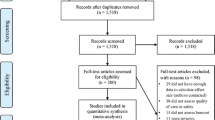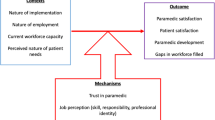Abstract
Clinical supervision is an embedded resource for practice quality in community mental health organizations. Supervision has been found to increase provider competence and decrease stress. In addition, supervision has been associated with service user outcomes including decreased depressive symptoms. However, little is known about the availability and nature of supervision in real world settings. The primary aims of this study were to identify available supervision and the extent to which contextual factors are related to that availability. The data source for this study was a multi-state and multi-site (N = 14) NIMH-funded trial survey of providers (N = 273). Supervision was measured by hours per week (quantity) and by utilization of best practice activities (content). Univariate, Chi square, independent samples t-tests, and ANOVA analyses were used to assess supervision content and quantity and to examine subgroup differences. Participants reported an average of 2.17 h of supervision per week and 28.6% of participants endorsed best practice content. Supervision quantity varied significantly across sites (p < 0.05) and program type (p < 0.05) while content did not. Individual role within the organization had a significant relationship with reported supervision content (p < 0.001). In these settings, staff in organizations are exercising discretion in how to utilize supervision within the available time. Supervision time also varied by program type, increasing with the intensity of services. Findings demonstrate that reports of availability vary according to position within the organization and the intensity of services within a given program type. Implications for workforce development, access to quality services, and implementation of evidence-based practices are discussed.

Similar content being viewed by others
References
Accurso, E. C., Taylor, R. M., & Garland, A. F. (2011). Evidence-based practices addressed in community-based children’s mental health clinical supervision. Training and Education in Professional Psychology, 5, 88–96. https://doi.org/10.1037/a0023537.
Bambling, M., King, R., Raue, P., Schweitzer, R., & Lambert, W. (2006). Clinical supervision: Its influence on client-rated working alliance and client symptom reduction in the brief treatment of major depression. Psychotherapy Research, 16, 317–331. https://doi.org/10.1080/10503300500268524.
Bearman, S. K., Schneiderman, R. L., & Zoloth, E. (2017). Building an evidence base for effective supervision practices: An analogue experiment of supervision to increase EBT fidelity. Administration and Policy in Mental Health and Mental Health Services Research, 44, 293–307. https://doi.org/10.1007/s10488-016-0723-8.
Bearman, S. K., Weisz, J. R., Chorpita, B. F., Hoagwood, K., Ward, A., Ugueto, A. M., & Bernstein, A. (2013). More practice, less preach? The role of supervision processes and therapist characteristics in EBP implementation. Administration and Policy in Mental Health and Mental Health Services Research, 40, 518–529. https://doi.org/10.1007/s10488-013-0485-5.
Beidas, R. S., Edmunds, J. M., Cannuscio, C. C., Gallagher, M., Downey, M. M., & Kendall, P. C. (2013). Therapists’ perspectives on the effective elements of consultation following training. Administration and Policy in Mental Health and Mental Health Services Research, 40, 507–517. https://doi.org/10.1007/s10488-013-0475-7.
Berger, C., & Mizrahi, T. (2001). An evolving paradigm of supervision within a changing health care environment. Social Work in Health Care, 32(4), 1–18. https://doi.org/10.1300/J010v32n04_01.
Bernard, J. M., & Goodyear, R. K. (2014). Fundamentals of clinical supervision (5th edn.). New Jersey: Pearson.
Bogo, M., & McKnight, K. (2006). Clinical supervision in social work. The Clinical Supervisor, 24, 49–67. https://doi.org/10.1300/J001v24n01_04.
Bogo, M., Shlonsky, A., Lee, B., & Serbinski, S. (2014). Acting like it matters: A scoping review of simulation in child welfare training. Journal of Public Child Welfare, 8, 70–93. https://doi.org/10.1080/15548732.2013.818610.
Borders, L. D., Glosoff, H. L., Welfare, L. E., Hays, D. G., DeKruyf, L., Fernando, D. M., & Page, B. (2014). Best practices in clinical supervision: Evolution of a counseling specialty. The Clinical Supervisor, 33, 26–44. https://doi.org/10.1080/07325223.2014.905225.
Carpenter, J., Webb, C. M., & Bostock, L. (2013). The surprisingly weak evidence base for supervision: Findings from a systematic review of research in child welfare practice (2000–2012). Children and Youth Services Review, 35(11), 1843–1853. https://doi.org/10.1016/j.childyouth.2013.08.014.
Chorpita, B. F., Becker, K. D., & Daleiden, E. L. (2007). Understanding the common elements of evidence-based practice. Journal of the American Academy of Child and Adolescent Psychiatry, 46, 647–652. https://doi.org/10.1097/chi.0b013e318033ff71.
Choy-Brown, M. (2016). Proceedings of the 3rd Biennial Conference of the Society for Implementation Research Collaboration (SIRC) 2015: Advancing efficient methodologies through community partnerships and team science. Implementation Science, 11(Suppl 1), 85.
Choy-Brown, M., Stanhope, V., Tiderington, E., & Padgett, D. (2015). Unpacking clinical supervision in transitional and permanent supportive housing: Support or scrutiny? Administration & Policy in Mental Health & Mental Health Services Research, 43(4), 546–554.
Dill, K., & Bogo, M. (2009). Moving beyond the administrative: Supervisors’ perspectives on clinical supervision in child welfare. Journal of Public Child Welfare, 3, 87–105. https://doi.org/10.1080/15548730802695105.
Dorsey, S., Kerns, S. E., Lucid, L., Pullmann, M. D., Harrison, J. P., Berliner, L., & Deblinger, E. (2018). Objective coding of content and techniques in workplace-based supervision of an EBT in public mental health. Implementation Science. https://doi.org/10.1186/s13012-017-0708-3.
Dorsey, S., Pullmann, M. D., Deblinger, E., Berliner, L., Kerns, S. E., Thompson, K., & Garland, A. F. (2013). Improving practice in community-based settings: A randomized trial of supervision—study protocol. Implementation Science, 8(89), 1–11. https://doi.org/10.1186/s13012-018-0754-5.
Ellis, M. V., Berger, L., Ayala, E. E., Swords, B. A., & Siembor, M. (2013). Inadequate and harmful clinical supervision: Testing a revised framework and assessing occurrence. The Counseling Psychologist, 42, 434–472. https://doi.org/10.1080/15548730802695105.
Evans, T. (2011). Professionals, managers and discretion: Critiquing street-level bureaucracy. The British Journal of Social Work, 41, 368–386. https://doi.org/10.1093/bjsw/bcq074.
Gleacher, A. A., Nadeem, E., Moy, A. J., Whited, A. L., Albano, A. M., Radigan, M., & Hoagwood, K. E. (2011). Statewide CBT training for clinicians and supervisors treating youth: The New York State evidence-based treatment dissemination center. Journal of Emotional and Behavioral Disorders, 19, 182–192. https://doi.org/10.1177/1063426610367793.
Henggeler, S., & Schoenwald, S. (1998). Multisystematic therapy supervisor manual: Promoting quality assurance at the clinical level. Charleston: MST Institute.
Henggeler, S., Schoenwald, S., Liao, J., Letourneau, E., & Edwards, D. (2002). Transporting efficacious treatments to field settings: The link between supervisory practices and therapist fidelity in MST programs. Journal of Clinical Child and Adolescent Psychology, 31, 155–167. https://doi.org/10.1207/S15374424JCCP3102_02.
Hoge, M. A., Migdole, S., Cannata, E., & Powell, D. J. (2014). Strengthening supervision in systems of care: Exemplary practices in empirically supported treatments. Clinical Social Work Journal, 42, 171–181. https://doi.org/10.1007/s10615-013-0466-x.
Hoge, M. A., Migdole, S., Farkas, M. S., Ponce, A. N., & Hunnicutt, C. (2011). Supervision in public sector behavioral health: A review. The Clinical Supervisor, 30, 183–203. https://doi.org/10.1080/07325223.2011.604276.
Hoge, M. A., Morris, J. A., Daniels, A. S., Stuart, G. W., Huey, L. Y., & Adams, N. (2007). An action plan for behavioral health workforce development: A framework for discussion. Rockville, MD: Substance Abuse and Mental Health Services Administration, U.S. Department of Health and Human Services.
Hoge, M. A., Wolf, J., Migdole, S., Cannata, E., & Gregory, F. X. (2016). Workforce development and mental health transformation: A state perspective. Community Mental Health Journal, 52, 323–331. https://doi.org/10.1007/s10597-015-9953-6.
Institute of Medicine. (2015). Psychosocial interventions for mental and substance use disorders: A framework for establishing evidence-based standards. Washington, DC: The National Academies Press.
Kadushin, A., & Harkness, D. (2002). Supervision in social work (4th edn.). New York: Columbia University Press.
Kolb, D. A. (1984). Experiential learning: Experience as the source of learning and development. Englewood Cliffs: Prentice Hall.
Laschober, T. C., de Tormes Eby, L. T., & Sauer, J. B. (2012). Clinical supervisor and counselor perceptions of clinical supervision in addiction treatment. Journal of Addictive Diseases, 31, 382–388. https://doi.org/10.1080/10550887.2012.735599.
Lipsky, M. (2010). Street-level bureaucracy: Dilemmas of the individual in public services. New York: Russell Sage Foundation.
Martino, S., Ball, S. A., Gallon, S. L., Hall, D., Garcia, M., Ceperich, S., & Hausotter, W. (2006). Motivational interviewing assessment: Supervisory tools for enhancing proficiency. Salem: Northwest Frontier Addiction Technology Transfer Center, Oregon Health and Science University.
Milne, D., & Dunkerley, C. (2010). Towards evidence-based clinical supervision: The development and evaluation of four CBT guidelines. The Cognitive Behaviour Therapist, 3, 43–57. https://doi.org/10.1017/S1754470X10000048.
Milne, D., & Reiser, R. P. (2011). Observing competence in CBT supervision: A systematic review of the available instruments. The Cognitive Behavioral Therapist, 4, 89–100. https://doi.org/10.1017/S1754470X11000067.
Milne, D. L. (2009). Evidence-based clinical supervision: Principles and practice (1st edn.). Chichester: Wiley.
Milne, D. L., & Reiser, R. P. (2017). A manual for evidence-based CBT supervision. Hoboken: Wiley.
Mor Barak, M., Travis, D., Pyun, H., & Xie, B. (2009). The impact of supervision on social work outcomes: A meta analysis. Social Service Review, 83, 3–32. https://doi.org/10.1086/599028.
Mosley, J. E., & Smith, S. R. (2018). Human service agencies and the question of impact: Lessons for theory, policy, and practice. Human Service Organizations: Management, Leadership & Governance, 42, 113–122. https://doi.org/10.1080/23303131.2018.1425953.
National Association of Social Work & Association of Social Work Boards. (2012). Best practice standards in social work supervision. Retrieved from http://www.socialworkers.org.
National Association of Social Work Insurance Trust. (2004). Supervisor beware: Reduce your risk for vicarious liability. Retrieved from http://www.naswassurance.org/pdf/PP_Vicarious_Liability.pdf.
New York State Education Department. (2017). LCSW license requirements. Retrieved from http://www.op.nysed.gov.
New York State Office of Mental Health. (2007). Assertive Community Treatment Guidelines. Retrieved from https://www.omh.ny.gov.
Noelle, M. (2003). Self-report in supervision. The Clinical Supervisor, 21(1), 125–134. https://doi.org/10.1300/J001v21n01_10.
Rapp, C. A., Etzel-Wise, D., Marty, D., Coffman, M., Carlson, L., Asher, D., & Holter, M. (2010). Barrier to evidence-based practice implementation: Results of a qualitative study. Community Mental Health Journal, 46, 112–118. https://doi.org/10.1007/s10597-009-9238-z.
Salas, E., Tannenbaum, S. I., Kraiger, K., & Smith-Jentsch, K. A. (2012). The science of training and development in organizations: What matters in practice. Psychological Science in the Public Interest, 13, 74–101. https://doi.org/10.1177/1529100612436661.
Schoenwald, S., Mehta, T., Frazier, S., & Shernoff, E. (2013). Clinical supervision in effectiveness and implementation research. Clinical Psychology: Science and Practice, 20, 44–59. https://doi.org/10.1111/cpsp.12022.
Schoenwald, S., Sheidow, A., & Chapman, J. (2009). Clinical supervision in treatment transport: Effects on adherence and outcomes. Journal of Counseling and Clinical Psychology, 77, 410–421. https://doi.org/10.1037/a0013788.
Sewell, K. (2017). Theoretically grounded, evidence-informed clinical supervision for the SNAP programs: A model in development. The Clinical Supervisor, 36, 340–359. https://doi.org/10.1080/07325223.2017.1352549.
Sholomskas, D. E., Syracuse-Siewert, G., Rounsaville, B. J., Ball, S. A., Nuro, K. F., & Carroll, K. M. (2005). We don’t train in vain: A dissemination trial of three strategies of training clinicians in cognitive-behavioral therapy. Journal of Consulting and Clinical Psychology, 73, 106–115. https://doi.org/10.1037/0022-006X.73.1.106.
Shulman, L. (1993). Interactional supervision. Washington, D.C.: National Association of Social Workers Press.
Stanhope, V., Tondora, J., Davidson, L., Choy-Brown, M., & Marcus, S. (2015). Person-centered care planning and service engagement – A study protocol. Trials, 16(180), 1–11.
Substance Abuse and Mental Health Services Administration. (2012). Behavioral health, United States (HHS Publication No. [SMA] 13-4797). Rockville, MD: Substance Abuse and Mental Health Services Administration.
Substance Abuse and Mental Health Services Administration. (2013). Report to congress on the nation’s substance abuse and mental health workforce issues. Rockville: Substance Abuse and Mental Health Services Administration.
Supervision Competency Workforce Initiative. (2009). Enhancing supervisory skills in Connecticut’s behavioral health workforce. Retrieved from https://www.cwcbh.org/projects/supervisor_competency.
Whitaker, T., Weismiller, T., & Clark, E. (2006). Assuring the sufficiency of a frontline workforce: A national study of licensed social workers. Executive Summary. Washington, DC: National Association of Social Workers.
Whitley, R., Gingerich, S., Lutz, W. J., & Mueser, K. T. (2009). Implementing the Illness Management and Recovery program in community mental health settings: Facilitators and barriers. Psychiatric Services, 60, 202–209. https://doi.org/10.1176/appi.ps.60.2.202.
Whittemore, R., & Knafl, K. (2005). The integrative review: Updated methodology. Journal of Advanced Nursing, 52, 546–553. https://doi.org/10.1111/j.1365-2648.2005.03621.x.
Worthen, V. E., & Lambert, M. J. (2007). Outcome oriented supervision: Advantages of adding systematic client tracking to supportive consultations. Counsel Psychotherapy Research, 7, 48–53. https://doi.org/10.1080/14733140601140873.
Acknowledgements
This research was supported by Grant funding from the National Institute of Mental Health (F31MH110120-01A1 Examining Supervision as an Implementation Strategy to Improve Provider Adoption of Evidence-Based Practice & R01MH099012 Person-Centered Care Planning and Service Engagement).
Author information
Authors and Affiliations
Corresponding author
Rights and permissions
About this article
Cite this article
Choy-Brown, M., Stanhope, V. The Availability of Supervision in Routine Mental Health Care. Clin Soc Work J 46, 271–280 (2018). https://doi.org/10.1007/s10615-018-0687-0
Published:
Issue Date:
DOI: https://doi.org/10.1007/s10615-018-0687-0




